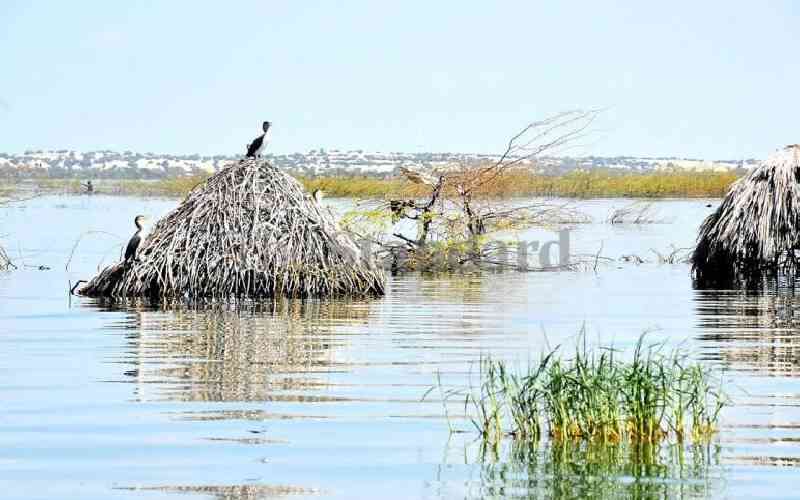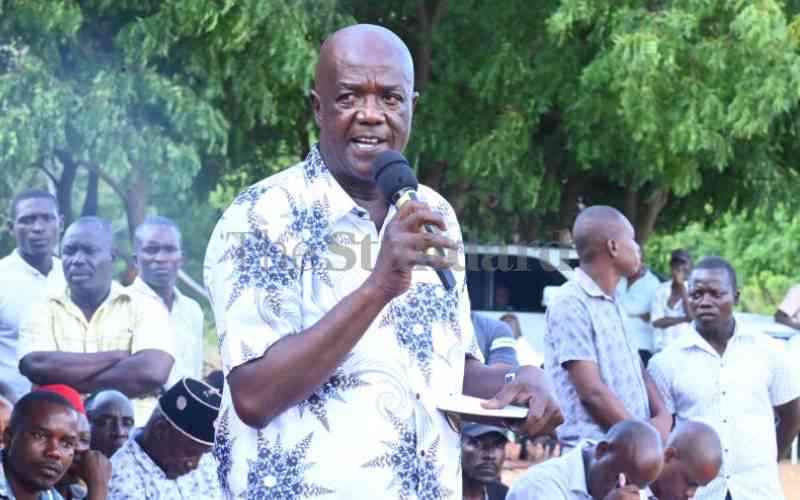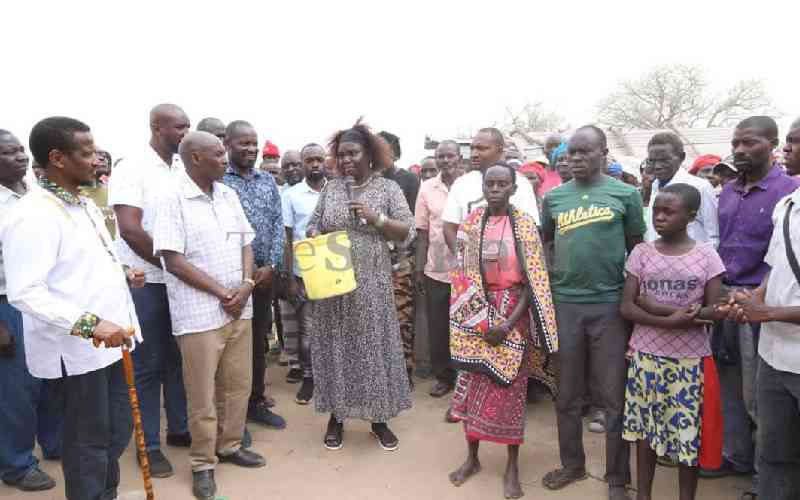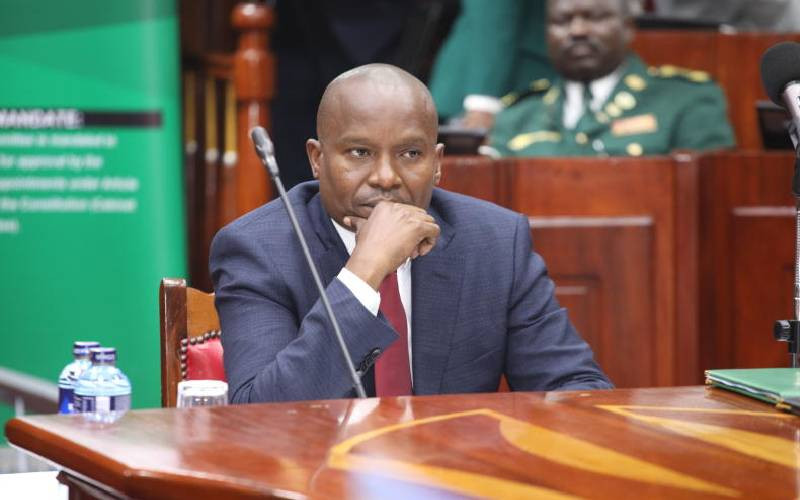 |
|
Kishushe residents show The Standard what passes for a road through their villages. [Photo:Pascal Mwandambo/Standard] |
By Pascal Mwandambo
There is a resigned look on Jared Mwakina’s face as he paces up and down his maize farm in Kishushe village, Taita Taveta County.
He has all the reasons to worry. This is another season that his crop has failed due to inadequate rainfall.
“At this rate, we may have to rely on relief food. There’s virtually nothing to harvest. All my maize crop is now only fodder for my livestock,” he says, wiping sweat from his temple.
Mwakina’s woes are shared by hundreds of other villagers. “Sometimes when we get enough rains to sustain our crops, elephants from the neighbouring Tsavo West National Park move into our farms and destroy all our crops. It’s a vicious cycle of poverty and suffering,” says Daftone Mwang’ombe, another resident.
Tiny rich village
Located in a shallow valley flanked on one side by the picturesque Marangu Hills to the west and Ngulia Hills further south, Kishushe is a tiny village, which has been blessed with vast resources including huge iron ore and copper deposits. There is also abundant wildlife resources that are a major tourist attraction.
Yet this is a rich community that has been betrayed by history. In fact what they call “town” is nothing but a dusty shopping centre where getting even mobile phone network is a hassle.
To add to the locals’ misery, the roads are in a pathetic state. Water shortage is the order of the day. Women and children suffer endlessly searching for the precious commodity, which they ferry home on their heads and also using donkeys.
But these beasts of burden in Kishushe hardly get a chance to browse or even bray as they are gagged tight most of the time, ostensibly to stop them from feeding on the little crops left in the farms.
The village holds one of the largest deposits of iron ore and copper in the country.
Positive projections
The iron ore in Kishushe is called magnetite type, which is the best ore for industrial use. The whole iron ore deposit is estimated to be worth more than Sh1 trillion.
Wanjala Mining Company, which is extracting the iron ore is projected to mine and export more than 100m tonnes of the ore this year estimated to be worth more than Sh20 billion.
However, controversy has continued dogging the mining project with most residents accusing the mining firm of short-changing them on an agreement Wanjala Mining Company entered with the Kishushe community through the Kishushe Development Trust Fund (KDTF) three years ago.
Stay informed. Subscribe to our newsletter
“The iron ore mining company claims it cannot honour some of the conditions set out in the agreement because business has not been favourable. This beats logic because the company is still mining and exporting the ore. If business has not been as good as they would like us to believe, then they should cease the mining activities and leave Kishushe,” says Ellistone Mbela, a resident during a highly charged meeting held at Kishushe Social Hall.
The meeting, attended by Wundanyi MP Thomas Mwadeghu and directors from Wanjala Mining Company, had been called to review the terms of the agreement the mining company made with the community three years ago.
“The agreement between the company and Kishushe Development Trust Fund expired last year yet the company is still mining the iron ore. This is clearly a breach of trust on the part of the investor,” protests Mbela.
Major undertakings
According to the agreement, whose copy The Standard obtained, Wanjala Mining Company had undertaken to construct four rooms at Kishushe Dispensary, equip the labs, pipe water to Kishushe from Kishenyi Dam in Werugha location, pay Sh70 per tonne of iron ore extracted to KDTF as well as upgrading of local roads to marram standard.
“Most of our youths were rendered jobless after the mining company mechanised most of their mining activities. At this rate, the idle youths may be forced to go into unlawful acts such as poaching for bush meat to earn a living,” says Julius Mwasaru.
“At first we thought the mining company meant us well but now are getting disillusioned,” he says ruefully.
A director from Wanjala Mining Company Mr Mahamoud Kassam said the mining project had not been as lucrative as they had earlier projected but promised to undertake some of the projects they had agreed with the community.
Kassam, who gave out Sh4.6m to the KDTF officials, said already work had begun on the Kishushe Dispensary while plans had been finalised for laying pipes to supply water from Kishenyi Dam.
Area MP Thomas Mwadeghu said the controversies surrounding the iron ore mining project had been brought about partly by bad mining laws which he said should be reviewed to ensure that local communities benefit from the mineral resources on their land.
 The Standard Group Plc is a
multi-media organization with investments in media platforms spanning newspaper
print operations, television, radio broadcasting, digital and online services. The
Standard Group is recognized as a leading multi-media house in Kenya with a key
influence in matters of national and international interest.
The Standard Group Plc is a
multi-media organization with investments in media platforms spanning newspaper
print operations, television, radio broadcasting, digital and online services. The
Standard Group is recognized as a leading multi-media house in Kenya with a key
influence in matters of national and international interest.
 The Standard Group Plc is a
multi-media organization with investments in media platforms spanning newspaper
print operations, television, radio broadcasting, digital and online services. The
Standard Group is recognized as a leading multi-media house in Kenya with a key
influence in matters of national and international interest.
The Standard Group Plc is a
multi-media organization with investments in media platforms spanning newspaper
print operations, television, radio broadcasting, digital and online services. The
Standard Group is recognized as a leading multi-media house in Kenya with a key
influence in matters of national and international interest.









